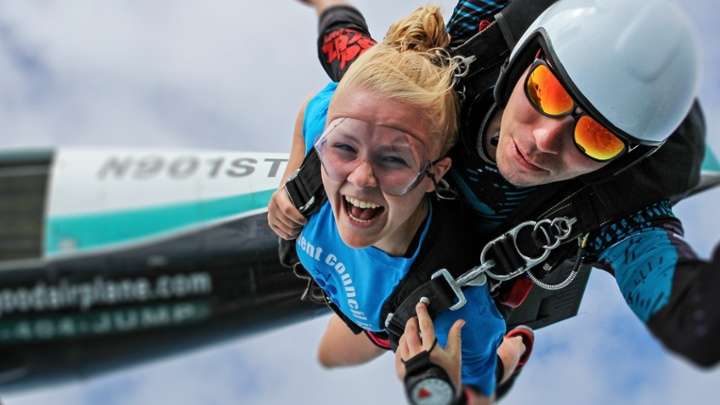There are a lot of common questions about skydiving, and one of those is does skydiving hurt your ears. It's a fair question, since you're so high up in altitude and falling fast before opening your chute. To better understand why people worry about it, it's important to look at what happens when you skydive.
It's a great adventure and a real thrill ride, but that's not all it is. It's also not like anything else you'll do, and it can be a highly rewarding experience you'll talk about for years to come.
You want to fully enjoy the moment when you skydive. Knowing what to expect, and putting any fears you have to rest, can make your jump more enjoyable and more memorable. By working with your instructor, you'll learn everything you need to do to make your jump as safe and fun as possible.
Here are some of the most important things you need to know about the noise you'll hear when skydiving, and whether you're putting your ears at risk by jumping out of a plane.

Skydiving Does Not Hurt Your Ears Long-Term
If you’re wondering whether skydiving hurts your ears (temporarily or permanently), the short answer is no. But where did this idea come from?
It probably got started because skydiving often means hitting freefall speeds of up to 120 mph. It's exciting, but due to the wind rushing by your head at that speed, it's also loud.
That has raised the question about whether skydiving could cause permanent damage to your hearing. But no, it won't do that. Especially if you only skydive once, it's not putting you at any kind of risk for hearing problems. It's just noisy.
If you find that you're skydiving multiple times, though, you can choose a helmet or another type of head protection. While it's not needed due to a risk of hearing damage, you may want to do it just so the wind isn't so loud for you. It's more about comfort than it is about safety.
Some people like the ear protection because it's quieter than the typical noise of the wind rushing past them. Others don't want to wear ear protection, because they don't want anything to take away from the full sensory experience they're having.
Keep in mind that your ears could also feel and sound a little different for a while when you're back on the ground, as well. For example, when you land from a skydiving adventure you might find that you experience "stuffy" ears for a little while.
This is temporary, though, and that full, slightly plugged feeling will often dissipate pretty quickly after landing. It's just a result of the rushing wind and the altitude change, and not a sign that there's any kind of damage being done to your ears or hearing.
Can Skydiving Cause Temporary Ear Pain?
Potentially, yes. Again, It's more commonly seen in people who have a cold or a sinus issue at the time of their skydive. If you have significant allergies, you might also experience some kind of discomfort. That can come from allergens, as well as the change in pressure in your sinuses as you change altitude.
If allergies, sinus issues, and other illnesses aren’t a concern for you right now, then you’ll most likely only experience your ears “popping” as altitude changes.
If you’re feeling uncertain, it’s important to speak to your doctor prior to a jump. That way, you can take steps to reduce any discomfort you may feel so that you have a more enjoyable jump.
Should You Wear Ear Protection When Skydiving?
Generally speaking, you don’t need to wear ear protection when skydiving unless you’re concerned about your ears or hearing. If you have a known medical condition or issue with your ears, speak to your doctor prior to your jump to .
Also, if you have concerns about the integrity of your hearing, you can choose to wear ear coverings or a noise-reducing helmet to reduce any potential risk you may be worried about.
A dropzone can't advise you whether you should or shouldn't be wearing hearing protection when you jump. That's giving medical advice, and it's not allowed. Plus, if you're told you don't need it, but you actually do, the dropzone could get into trouble.
Most people really don't need any kind of ear protection when they go skydiving, but that may not apply to you for various reasons. If you think you might need hearing protection when you skydive, talk to your doctor before you schedule your jump.
That way you have time for a consultation with a medical professional you trust, and you can take any precautionary measures that professional recommends. Those kinds of precautions would generally be wearing either ear protection or some type of noise-reducing helmet, both of which can keep the wind out of your ears and also reduce the noise you hear.
Ready to Take a Skydiving Adventure?
If you're ready to take a skydiving adventure, but you're not sure what all you may experience, you can get good information to help you feel more comfortable. For example, our tandem skydiving guide can give you the knowledge you're looking for.
It's packed full of tips, tricks, and tidbits, along with some great detail on what it's like to jump from an airplane. We'll be here when you're ready to book your jump and come experience the exhilaration of a tandem skydive!


